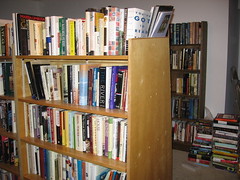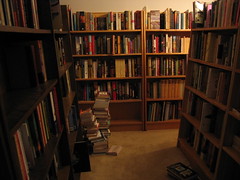Five Tips to Avoiding Total Disaster as a Novelist from a Poor, Wretched Fool Who Had to Learn the Hard Way
by Kris Saknussemm
Author of Zanesville: A Novel
The problem with should advice is that it’s either something you already know, i.e. your diet should include more fruit and vegetables than cheeseburgers and martinis -- or it’s something really difficult (like consuming more fruit and vegetables than cheeseburgers and martinis). So, based on my own stumbling, fumbling experience, I offer the following list of things I would strongly advise aspiring and despairing writers not to do. I doubt that simply by avoiding these pitfalls you will be guaranteed international fame and fortune, but I’m confident that you will at least escape many unnecessary frustrations and defeats, so that you can be fresh for the really poignant failures and setbacks that will either make or break you -- and with any luck will do a bit of both.
First Tip. Do not spend years gathering interesting material -- odd quotations, overheard remarks, colorful phrases, bits of trivia, weird statistics and obscure facts in the hope that you will one day find a story to contain them. I ended up with a literal warehouse of such stuff and I can tell you now with considerable confidence that the larvae of the human botfly bore into the skin and gorge themselves, emerging as centimeter long maggots, while a Joshua Hendy nine-thousand horsepower steam turbine delivers a cruising speed of 16 knots at 78 rpm. There is nothing wrong in knowing that if left underwater for years brass gives off a bright verdigris stain or that the first Birds of Paradise shipped back to Europe had their legs chopped off to facilitate packing, but the collection of details is like any acquisitive habit -- potentially obsessive. You can end up with a novel that reads like the Gospel according to St. Matthew translated into the Duke of York Island language and a response from the publishing industry reminiscent of a deserted poolroom on the shore of Sheepshead Bay. Put bluntly, burn your notebooks and clear your head.
Tip #2. Do not spend years experimenting with different forms of writing and various intellectual follies such as cut-ups and verbal collages, intricate multiple person narratives, dream stories, recipe books, anatomies, imaginary academic theses and the like. Yes, it’s true that some of the world’s most interesting literature has elements of these forms -- but that was then and this is different. If you are serious about getting a work of fiction published today you need quick sharp answers to the following questions. In what section of a bookstore or retailer’s website will your book be found? Which authors can your work be likened to? In three sentences or less what’s your novel about?
Tip #3. The Puritans believed in covering the body for modesty’s sake. Yet they developed a sexualized fascination for the ears of women and the noses of men. My point? (See Tip #1) In apparent restriction there is unexpected release. Dickens created over 800 individual characters and laid down some of the most intense cultural satire in English -- but his writing really came into focus when Wilkie Collins hipped him to the detective story. I struggled for years trying to find a form for my writing, flitting around like a Ulysses butterfly. The moment I gave myself permission to write an action/adventure story, things started falling into place. Modern art has provided artists with unparalleled and some might argue paralyzing freedom. Don’t waste time trying to create a new form. It’s given to very few people in any medium to do that -- and many of their achievements end up looking like legless Birds of Paradise later. A seemingly simple repetitive musical style like the Blues has proven capable of expressing the full spectrum of human experience and has inspired countless variations and mutations. Give yourself over to an established structure and follow its guidelines, and suddenly interesting points will emerge to surprise you.
Tip #4. Read your work aloud, to some willing victim ideally, but at least to yourself. Storytelling began as an oral form and the ear (however erotically appealing) has a trueness to it that will reveal what’s working and what’s not in a more immediate and decisive way than simply scanning the page. This discipline will also slow you down psychologically and bring you into more intimate contact with your story. In the end, it will take no more time than reading back a page silently.
Tip #5. Ignore all reasonable sounding advice like “write about what you know,” “read as much as you can,” or “try to write every day.” If you need to hear this advice you are in the wrong game. But more importantly, reasonableness won’t get the job done. One day in an ice-stricken back alley in Boston I saw a fat little Irishman beat the daylights out of four larger, stronger assailants. When it was over, and it was over astonishingly quickly, he brushed himself off and said simply, “I had to get unreasonable with ‘em.”
Unless you are willing to face the unreasonable in yourself -- unless you are willing to entertain some strange notions (and deal with them when they stick around) -- unless you are willing to get lost, confused and even terrified -- then what you’re doing won’t have any meaning. The famous device of conflict upon which all stories are supposed to hinge starts within the writer. You are all the characters in your dreams and so too with a novel. You can’t put your creations into jeopardy or into embarrassing or miraculous situations without going there yourself, and that is not a sensible ambition for a grown person to have. As a writer who has made more mistakes than most, my goal above all else is to be very, very unreasonable.
Copyright © 2005 Kris Saknussemm
About the Author:
Kris Saknussemm grew up in the San Francisco Bay Area but has for a long time lived abroad, in the Pacific Islands and Australia. A painter and sculptor as well as a writer, his fiction and poetry have appeared in such publications as The Hudson Review, The Boston Review, The Antioch Review, New Letters and ZYZZYA.
Zanesville (Villard; October 2005) is his first novel and the first in a series of books called The Lodemania Testament. For more information, please visit these websites
www.saknussemm.com or
www.zanesvillethenovel.com
*Article printed here with permission from the publisher





 (link via
(link via 
